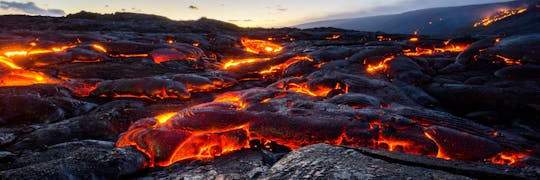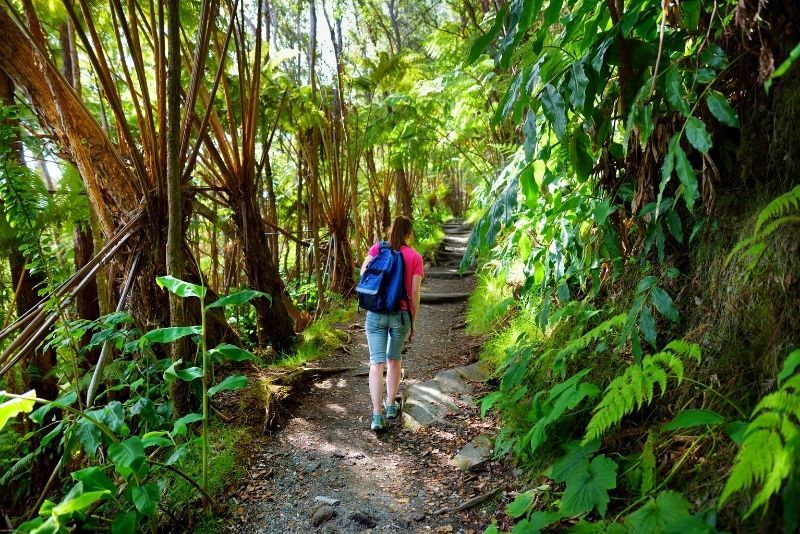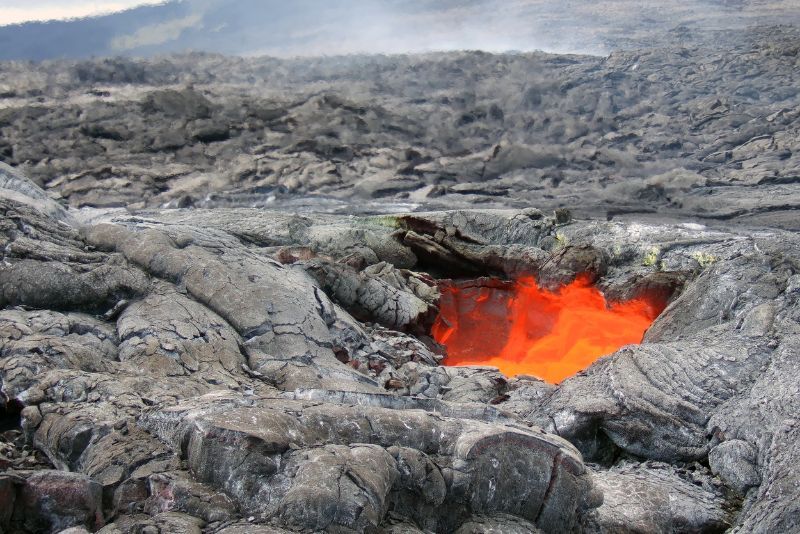Hawaiʻi Volcanoes National Park: Day Trips and Tours from Big Island
Home to two of the world's most active volcanoes, Kilauea and Mauna Loa, the 333,000-acre Hawaii Volcanoes National Park is a coming-together of Mother Nature's forces and beauty unlike anything else.
Tour options are aplenty; from all-day hiking adventures to helicopter flights, twilight stargazing activities, cave exploring, ranger-led programs and biking trips, you're sure to find something that scratches your itch for adventure. Whatever your preference, day tours to Hawaii Volcanoes National Park are quintessential.
Home to two of the world's most active volcanoes, Kilauea and Mauna Loa, the 333,000-acre Hawaii Volcanoes National Park is a coming-together of Mother Nature's forces and beauty unlike anything else.
Tour options are aplenty; from all-day hiking adventures to helicopter flights, twilight stargazing activities, cave exploring, ranger-led programs and biking trips, you're sure to find something that scratches your itch for adventure. Whatever your preference, day tours to Hawaii Volcanoes National Park are quintessential.

(0/24) checking Musement...
Home to two of the world's most active volcanoes, Kilauea and Mauna Loa, the 333,000-acre Hawaii Volcanoes National Park is a coming-together of Mother Nature's forces and beauty unlike anything else.
Tour options are aplenty; from all-day hiking adventures to helicopter flights, twilight stargazing activities, cave exploring, ranger-led programs and biking trips, you're sure to find something that scratches your itch for adventure. Whatever your preference, day tours to Hawaii Volcanoes National Park are quintessential.

Up next you will find our detailed guide on the Hawaii Volcanoes National Park, one of the most unique day trips in Big Island.
Where is Hawaii Volcanoes National Park located on the Big Island?
Hawaii Volcanoes National Park is located on the southeastern side of the Big Island and covers approximately half of the island. The park's main section sits southwest of Hilo, Hawaii's main city.
Hawaii Volcanoes National Park by car
From Hilo, take Highway 11 southwest for about a 45-minute drive.
From Kailua-Kona, take Highway 11 east for about a 2-hour drive. If you're staying in Waikoloa, it's about 2 hours to drive along Highway 200.
Hawaii Volcanoes National Park by bus/public transport
The Hele-On bus service provides transport to Hawai'i Volcanoes National Park and Mauna Kea State Recreation Area seven days a week. You can take Route 10, Route 11 or Route 12 to get you to the park, but there is no public transportation or shuttle service available within the park itself.
Guided tour to Hawaii Volcanoes National Park
The most hassle-free option is to join a guided tour. These full-day tours include pick up from your accommodation, transport to the park and a guided excursion of the attractions.
How much do tickets cost?
- Adults (16 and above): US$15
- Children (15 and under): Free
- Per vehicle of up to 15 persons: US$30
- Per motorcycle: US$25
The ticket is valid for seven days and gives you access to both Kilauea and Mauna Loa volcanoes, as well as the Thurston Lava Tube and more.
When can I visit the Hawaii Volcanoes National Park for free?
Entrance is free to the Hawaii Volcanoes National Park on the following days:
- First Day of National Park Week in April
- Anniversary of Great American Outdoors Day on Aug. 4
- National Public Lands Day on Sept. 24
- Veterans Day on Nov. 11
What is the typical itinerary of a Hawaii Volcanoes National Park day tour on the Big Island?
Starting with convenient hotel pickup from almost anywhere on the island, your guide will whisk you away to Hawaii Volcanoes National Park. If departing from Hilo, you'll have time to quick drive through the quaint town to see Historic Banyan Drive and the Liliuokalani Gardens.
While there are many guided tours to choose from, typically you will hike through a lava field, walk through the Thurston Lava Tube, witness the Halemaumau Crater, and see the Kilauea Caldera up close. The infamous Fissure 8 is also a popular stop.
Depending on your tour, you'll likely also pass by places like Rainbow Falls and Richardson black sand beach en route to the National Park.
Afterward, you will have some free time to explore on your own before your guide takes you back to your hotel.
Generally, Hawaii Volcanoes National Park tours last a minimum of 5 to 6 hours. If you are combining it with other parts of the island on a comprehensive Hawaii highlights adventure, your day trip will be between 10 and 12 hours.
What are the most popular Hawaii Volcanoes National Park excursions?
You have a plethora of Hawaii Volcanoes National Park guided tours to choose from, suitable for different budgets, styles and schedules.
Guided tours to Hawaii Volcanoes National Park with hiking

The most common type of tour is a small group guided hike led by an experienced naturalist guide. You'll learn about the geology, ecology and history of the park, as you hike through lava fields and rainforests, and see the Halemaumau Crater.
Private tour of Hawaii Volcanoes National Park
Ideal for those who prefer quieter experiences or have specific interests, private tours can be customized to your needs. Private tours are more expensive than group tours but have the advantage of your own local guide and the flexibility to add different stops to your trip.
Kilauea Volcano bike tour

Great for outdoor adventurers, this bike tour takes you along Crater Rim Drive and then to the Thurston Lava Tube on two wheels. With e-bikes making it an easy ride, even those without strong biking legs can enjoy this tour.
Hawaii Volcanoes National Park eco tour
Focusing on the native flora and fauna, these unique tours teach about the geology, ecology and cultural history of the park. Capped off by a sunset eruption, this is one of the most popular tours.
Day trip to Hawaii Volcanoes National Park plus Kona Coffee Farm
This coffee tour starts with a pick-me-up at one of Hawaii's most famous coffee farms. After learning about (and tasting!) some of the best coffee in the world, you'll head to Hawaii Volcanoes National Park for a day of exploration.
Day tour to Hawaii Volcanoes National Park plus stargazing
A wonderful twilight experience, this tour starts with exploring the lava fields and rainforests of Hawaii Volcanoes National Park. As the day fades into night, you'll have the opportunity for stargazing in one of the world's most remote locations.
Hawaii Volcanoes National Park helicopter tour

A bucket-list experience, seeing Hawaii's volcanoes from the air is an unforgettable way to spend an afternoon. Choose your helicopter tour with either doors-on for the basic experience, or doors-off for the extra adrenaline.
How much do Hawaii Volcanoes National Park tours cost?
The price of your Hawaii Volcanoes National Park will depend on the type of tour you choose. Guided group hikes are the most affordable, starting at around US$150 to US$250 per person.
Private tours are more expensive and cost around US$600 per group of up to eight persons that include entrance to the national park, transportation and snacks.
A Kilauea Volcano bike tour will cost around US$230 per person, and Hawaii Volcanoes National Park eco tours are around US$200 per person.
The cost of a day trip to Hawaii Volcanoes National Park plus Kona Coffee Farm is between US$200 and US$300 per person, similarly priced to a stargazing tour.
What are the highlights on a Hawaii Volcanoes National Park day trip?
Hawaii Volcanoes National Park day tour will only be able to scratch the surface of all there is to see and do due to the park’s size. However, in one day, you can expect to see some of the most popular attractions, such as the Kilauea Volcano, which is one of the world's most active volcanoes, constantly erupting since 1983.
Among other famous sights is Mauna Loa At over 4,000 meters tall, which is officially the world's largest subaerial volcano, taller than Mount Everest when measured from its ocean base.
The Thurston Lava Tube, a natural cave formed by cooled and hardened lava, is the largest of its kind, measuring over 150 meters long.
Kilauea Caldera

The Kilauea Caldera is a large crater that was formed during a series of devastating eruptions between 1814 and 1924. Boasting a bubbling lake of lava, it's both impressive and geologically unique. Sitting within the Kīlauea Caldera, the Halema’uma’u Crater is 300 meters deep and also the volcano's most active vent.
Located just inside the park entrance, the Kilauea Visitor Center offers the perfect introduction to the history and geology of the area. Especially the educational volcanoes film.
Besides attractions within the national park, many tours also stop at Banyan Drive in Hilo Town, the Liliuokalani Gardens, Rainbow Falls State Park, black sand beaches, Big Island Candies and more.
When is the best time to visit it?
Summer (June to August) is the most popular time to visit Hawaii Volcanoes National Park. If you want to avoid the crowds, shoulder season (April/May and September/October) is a great time to go. Winter (November to March) is the quietest time of year.
With winter temperatures a balmy 26 degrees Celsius, there really is no bad time to visit.
Travel tips
- Wear comfortable shoes and clothing, as you'll be doing a lot of walking.
- Be sure to pack sunscreen, hats and sunglasses, as well as insect repellent.
- Bring lunch or snacks and plenty of water. Food inside the park is hard to come by, and it can become very hot, so you'll want to stay hydrated.
- For a hassle-free experience, book a guided tour. With hotel pickup and drop-off included, all you'll have to worry about is enjoying the breathtaking scenery.


